What is C++?
It’s simple to shoot oneself in the foot when using C; C++ makes it more difficult, but if you do, your entire leg is severed, this blog will take you on a journey towards C++.
Overview of C++, Introduction to C++
In the first section, we will learn the basics of C++, including a few highlights from the introduction.
Bjarne Stroustrup developed C++ as an object-oriented programming language in 1985; it features statically typed programming elements.
C++ is an extension to C which gives more control to programmers while offering them direct access to operating systems.

Used for everything from writing simple device drivers and code embedded systems directly through to building complex graphical user interfaces.
An object-oriented programming language designed for dynamic systems composed of moving, interactive objects. As this is a high-level language, its programs do not necessitate extensive knowledge about specific hardware to customize systems.
Contains utilities designed to simplify memory management, as well as support for object-oriented programming through classes and objects. With numerous libraries and frameworks available to it, this language offers great versatility.
What is C++?
It was initially created as an extension to C programming language in the 1970s by Bjarne Stroustrup; its first release to the public came later that same year in 1985.
C++ provides not only abstraction and object-oriented programming (OOP) features, but it combines high-level with low-level capabilities as well, giving developers access to functional coding paradigms for writing code that’s both efficient and performance based.

Language features such as classes, templates, operator overloading, exception handling and standard libraries make the language well suited to developing software across an extensive spectrum: system software development to game creation to desktop apps web services scientific simulations.
C++ programming language is well known for providing developers complete control over hardware resources and memory usage, making it exceptionally fast. Developers also gain granular control of resource allotment/deallocation API’s low-level features such as pointers or manual memory management capabilities.
programming language’s diverse community offers significant support to programmers through documentation, libraries and frameworks that make creating even complex software apps simpler than ever before.
C++Definition
Expands on the functionality of C programming language by including libraries for working with low-level memory accesses and performing system calls.
It supports OOP principles like data encapsulation, polymorphism, abstraction and inheritance for software developers, system architects and security engineers alike.
What does C++ do and what is C++ used for?
Have you given any attention to why this programming language is being prioritised? Come lets look into it.
A general-purpose programming language designed for everything from operating system development and application creation, all the way through server and client application creation.
An efficient high-level programming language designed for writing cross-platform programs efficiently, using its robust standard library as the backbone. Due to C++’s object-oriented nature, developers are also able to more quickly create new objects while manipulating existing ones.
Due to its flexibility, C++ has found application across numerous industries.
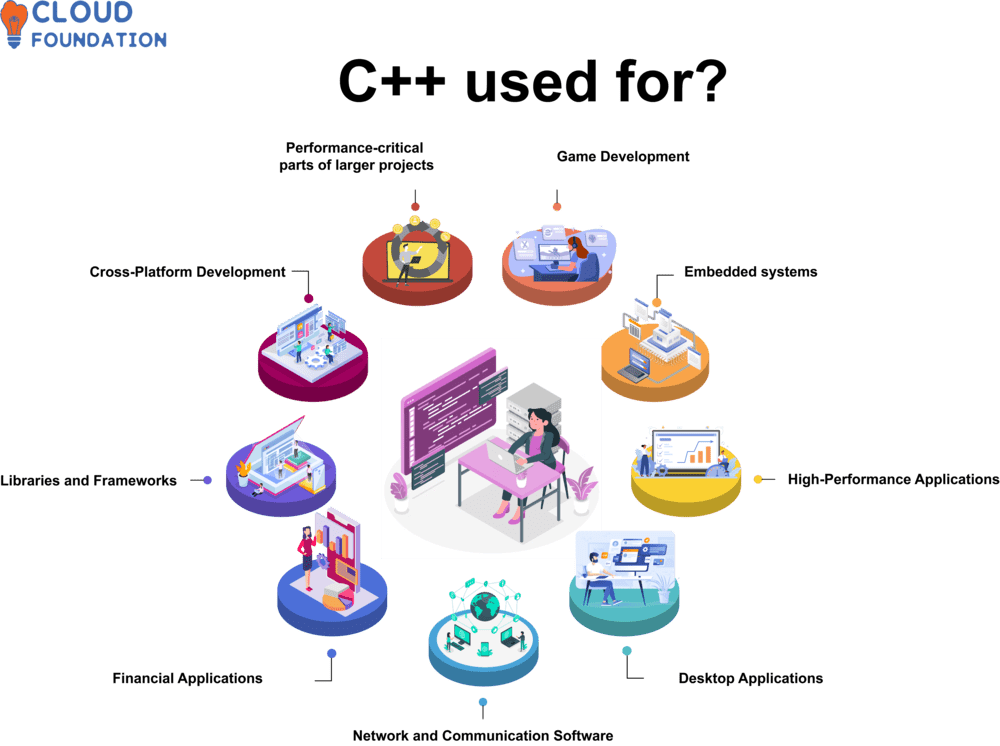
Game Development: C++ has long been used as the language of choice for game development due to its speed, capacity to manage hardware resources effectively and compatibility with various graphical toolkits and game engines.
Embedded systems:Microcontrollers and other embedded systems utilize C++ due to its efficient memory utilization and direct hardware access capabilities.
High-Performance Applications: Scientific simulations, mathematical modelling, computer vision processing and signal processing are among several high-performing applications that leverage C++’s speed and efficiency to their full advantage.
Desktop Applications: C++ utilized for creating desktop application using frameworks like Qt, wxWidgets and MFC to develop sophisticated graphical user interfaces (GUIs).
Network and Communication Software: C++ used to develop network protocols, routers and switches as well as any software related to networking or communications networks.
Financial applications: C++ has become widely-used across numerous financial applications such as trading platforms, risk management programs, algorithmic trading platforms and high-frequency trading systems.
Libraries and frameworks: Popular C++ libraries such as Boost, OpenCV, TensorFlow and Qt offer programmers’ powerful tools and abstractions suitable for various uses.
Cross-Platform Development: C++ supports cross-platform development, macOS, Linux and embedded systems.
Performance-critical parts of larger projects:Large projects often use C++ for its most CPU and time intensive aspects in other languages (Python or Java) in order to reach optimal performance.
How does C++ Work?
Think for a second how you can make use of this language.
In order to make the procedure and the ideas in your message as clear as possible, I have laid them out for you below.
Compilation is the process by which source code of programming languages like C++ is converted to computer-friendly binary code by means of compilation; for this task a special software known as a compiler is utilized as it reads source files to produce executable executable files.
These steps comprise the compilation process:
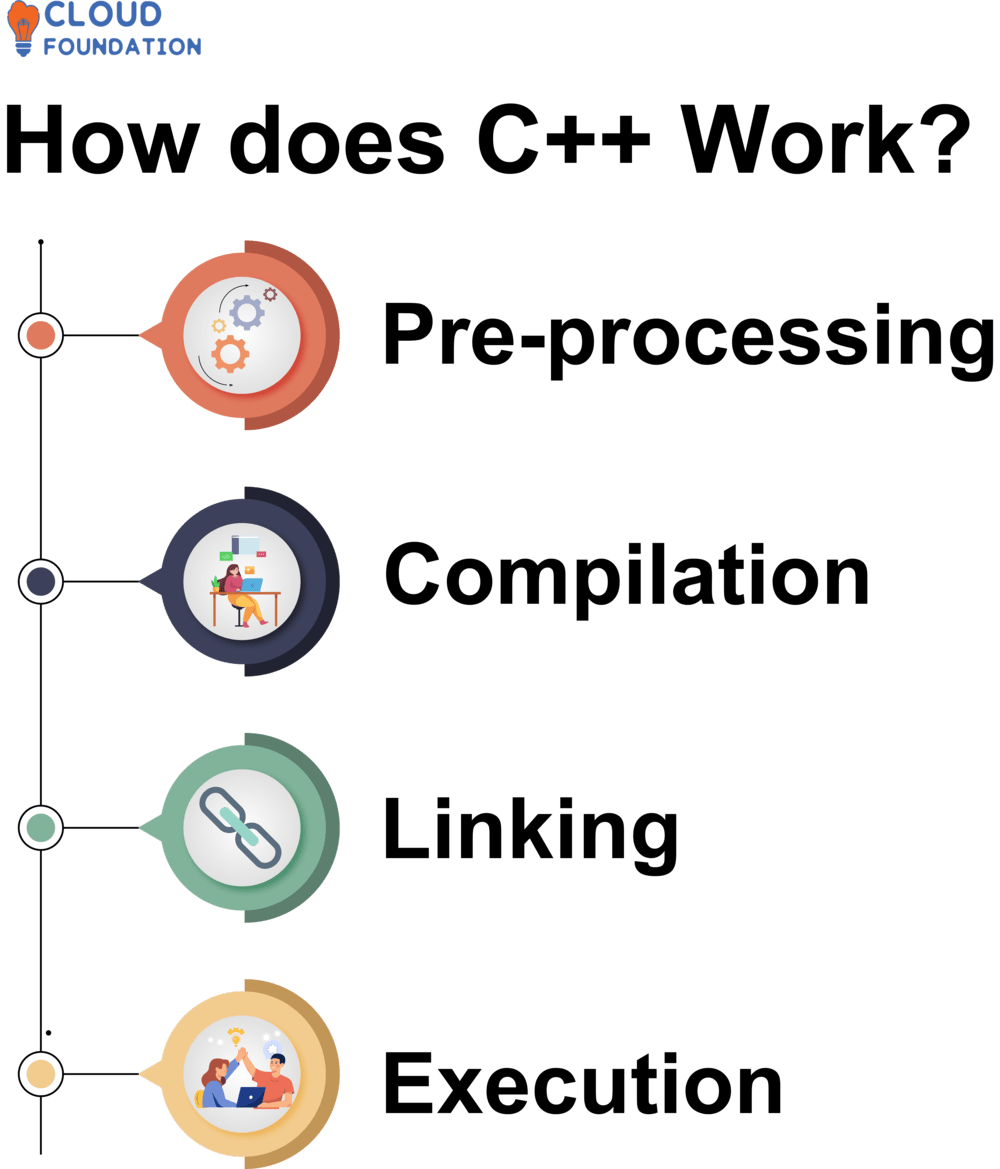
Pre-processing: Before compilation can begin, all code is pre-processed with specific instructions, macros and modifications being searched out and deleted accordingly.
Compilation: Compilation involves turning pre-processed code into “object code,” or instructions a machine can actually follow, for execution by itself.
Linking: “Linking,” on the other hand, involves joining together the object code with any additional libraries (for graphics and music purposes for instance) used as required (like images libraries etc).
Execution: Executing: Running code in an executable output file on a computer means testing its functionality to see whether its results work as expected.
Why C++ and what are the benefits of C++?
We have good and usable benefits from utilising C++ for this technology. Let us dive right in.
Itshigh speed, dependability and scalability has contributed to its widespread adoption. Furthermore, its highly expandable nature means programmers can add features or libraries as desired to C++. Furthermore, its long history means experts in numerous fields use it extensively.
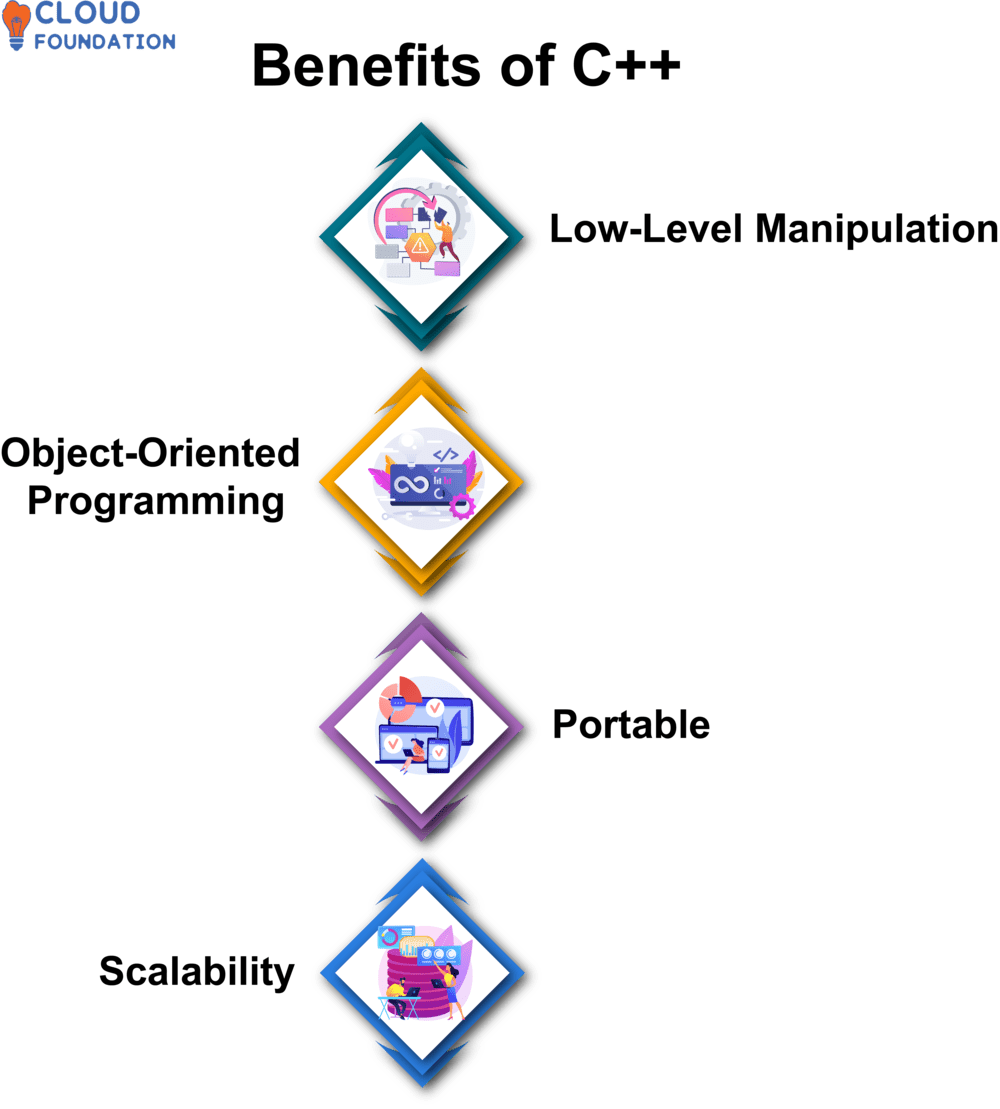
Low-Level Manipulation:It provides direct access to computer hardware, making low-level manipulation possible. Applications that rely heavily on memory or precise timing could benefit greatly from C++ as a low-level language.
Object-Oriented Programming:Excels at object-oriented programming (OOP), making its extensive collection of OOP features one of its major selling points. When writing code we utilize concepts like classes, objects, polymorphism, inheritance and abstraction – concepts used by C++ to help form our concepts of classes, objects polymorphism inheritance and abstraction.
Portable:Stands out by being easily portable between platforms; no code needs to be rewritten in order to run on another OS or system. Furthermore, its extensive feature set and rich stability make C++ an attractive solution for developing complex software like operating systems.
Scalability:Programming offers easy scalability to accommodate changing or growing requirements and ensures software stays relevant with changing demands. This ensures your business stays at the cutting-edge of tech innovation.
Advantages of C++
Now consider the advantages of C++.
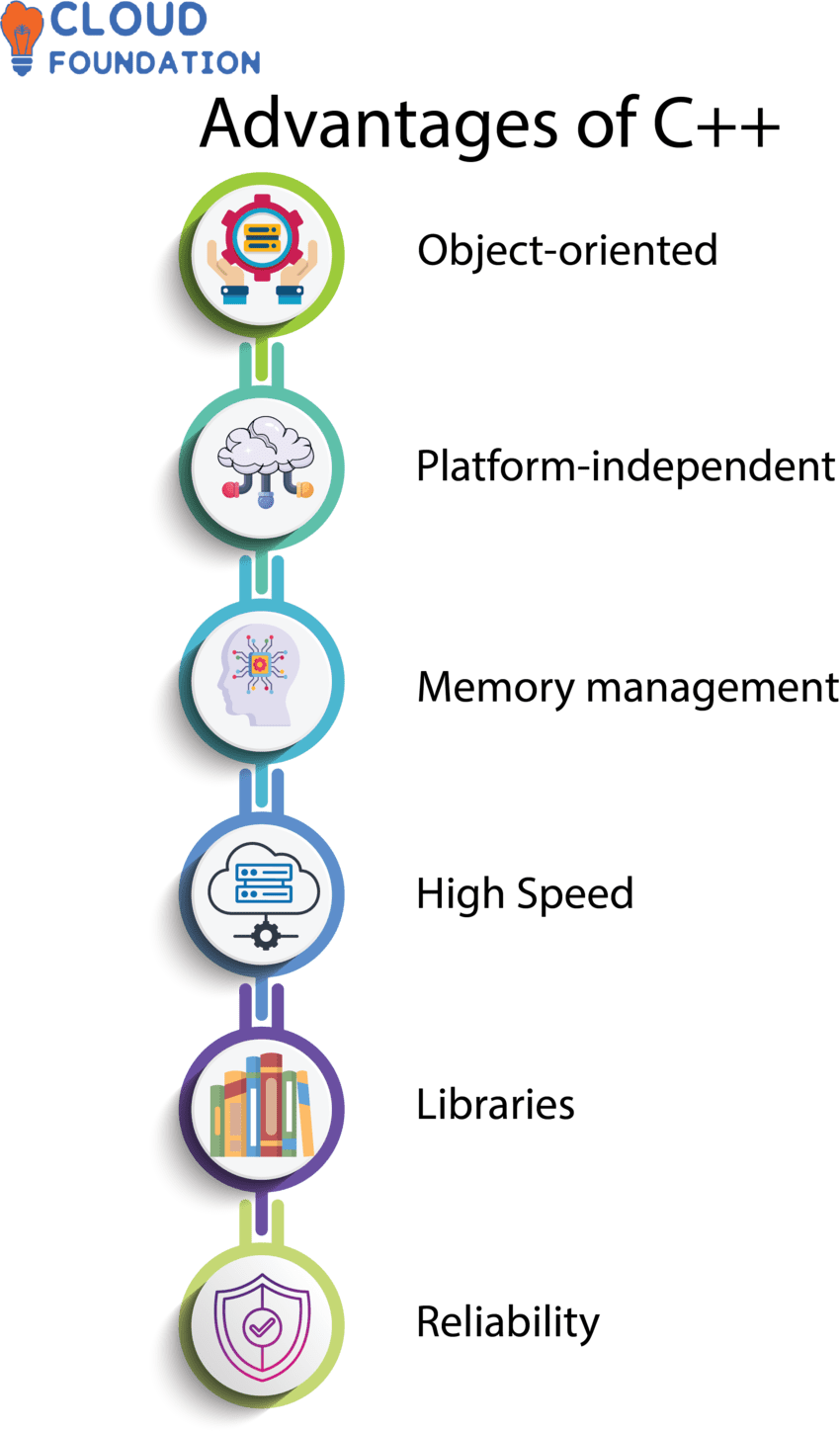
Object-oriented:Is an object-oriented language, supporting the creation of code objects which store both instructions and data, making large programs less daunting to manage and keep up with. This feature makes them much simpler for administrators and programmers.
Platform-independent:Provides the convenience of being written only once and produced for multiple platforms; making its deployment simple in multiple situations.
Memory management:Robust features, programmers find managing memory resources easy as well as searching out and fixing memory leaks quickly and effectively.
Scalability:Programming language offers developers many advantages when working on large-scale projects, as its easy scalability lets programs expand as programs and projects grow.
Speed:Its speedy operation closer to hardware often results in greater efficiencies which have an enormous effect on project outcomes.
Libraries:Comprehensive library support facilitates quick and effective program development.
Reliability:It has established itself as an dependable programming language due to the developers having had sufficient time to iron out kinks and build something reliable and enduring.
What is C++ software and how to use C++?
In this section, we’ll learn about the C++ tools we’ve been utilising. During our time spent programming, we will also have a look at the C++ language.
Bjarne Stroustrup created C++ as an expansion of C, featuring characteristics common among object-oriented languages such as encapsulation, inheritance, polymorphism and virtual functions.
Software programming tools are used for the creation of games and other entertainment software such as signal and image processors, embedded systems and system/application software applications.
C++ is an exciting high-level programming language with powerful and popular usage.
As part of your effort to learn C++, we’ve prepared this comprehensive tutorial:
Install a C++ Compiler: For any C++ development to succeed, a compiler must first be installed on your system and configured. Popular examples are GCC (GNU Compiler Collection), Clang and Microsoft Visual C++ Compiler – choose which ever one best matches up with your OS before setting it up!
Establish Your Development Environment: There are various options for writing C++ code; text editors such as Notepad++, Sublime Text and Visual Studio Code are excellent text editor choices while integrated development environments (IDEs) such as Code::Blocks, Eclipse or Microsoft Visual Studio may offer additional debugging or project management features that meet your specific requirements. Find an IDE or text editor (TE) that best matches your requirements!
Save Your File: When saving, name it according to its contents (hello.cpp is one example), appending “.cpp” at the end for easy identification later.
Compile Your Program: Launch a terminal or command prompt and navigate directly to where your C++ file resides, entering an appropriate command (GCC may provide examples here) in order to compile. Here is one such command that should work:
With this command, an executable file named Hello (or whatever its original name was) should be generated from hello.cpp source code without encountering any problems during compilation.
Run Your Program: Once compilation is completed, double-clicking on an executable is an easy way to launch it. For running applications directly in command prompt or terminal environments, enter their names (for instance: Hello in this instance) followed by Enter and press enter; for Hello programs this would look something like: hello.
C++ Modules
If you want a deeper grasp, learn C++ modules.
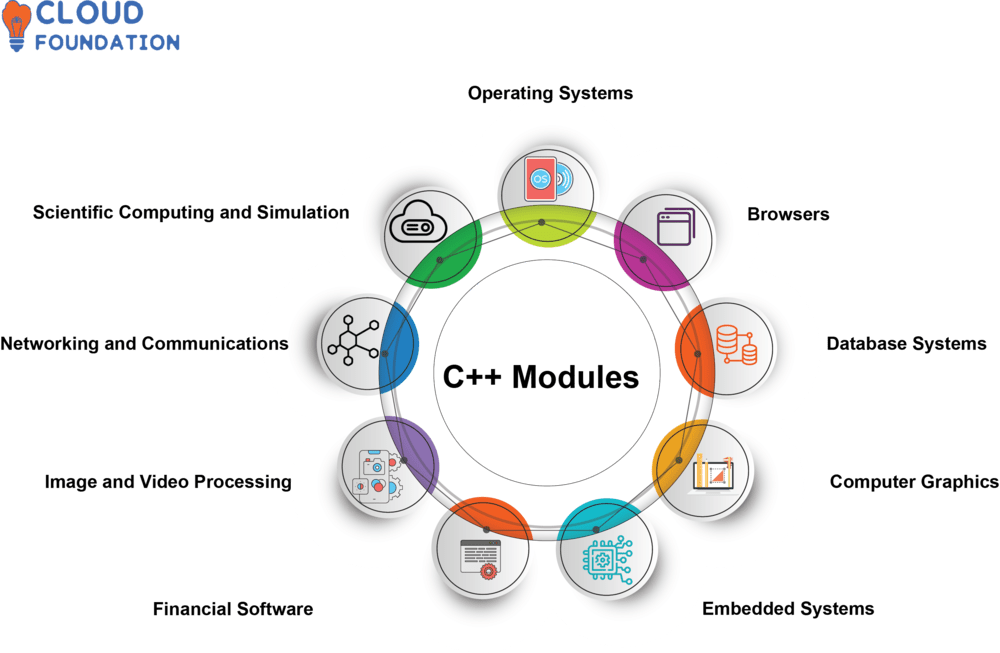
Operating Systems:It has long been utilized in the creation of various OSes, from Microsoft Windows and Apple Mac OS X to Linux distributions such as Ubuntu or Debian, with C++ often acting as its core framework or other essential parts.
Browsers: C++ has become the language of choice when developing popular web browsers such as Google Chrome and Mozilla Firefox, taking full advantage of C++’s speed and memory management features to deliver lightning-quick browsing experiences with minimal downtime and disruptions.
Database Systems: MySQL and PostgreSQL, two of the world’s most popular database management systems, both feature C++ components for efficient handling of large quantities of data. C++ offers low-level control while offering superior performance capabilities – something no other programming language can match.
Computer Graphics:Has become ubiquitous within the computer graphics industry. Bindings for 2D and 3D rendering libraries like OpenGL and DirectX exist for C++ use, as do processing programs such as Autodesk Maya, Adobe Photoshop and Blender which utilize C++ implementation for their graphics processing needs.
Embedded Systems:C++ has long been used in embedded systems development. From microcontrollers and Internet of Things devices to video game consoles and TVs, its low-level features and efficiency make it an excellent solution in situations with limited resources.
Financial Software:It has long been used as the go-to language for developing financial software, an area in which speed and dependability are of utmost importance. C++ can often be found being employed when developing trading systems, algorithmic trading platforms, risk management programs or high frequency trading systems using C++ as programming language.
Image and Video Processing: Adobe Photoshop, OpenCV (Open Source Computer Vision Library), and MPEG are among the many image and video processing programs which use C++ efficiently to manipulate multimedia data.
Networking and Communications:It was long been utilized as an indispensable language for communication, networking protocols and applications. Libraries offering similar network programming APIs as Boost.C++ may be found using Asio or POCO libraries; as well as being utilized to develop messaging platforms, network servers or real time call control (RTCW) applications using C++.
Scientific Computing and Simulation:Excels at performing tasks where speed is of the utmost importance, such as scientific computing and simulation.
C++ has long been utilized for simulation of physical phenomena, computational biology analysis and fluid dynamics analyses to libraries like Eigen and Armadillo which offer efficient linear algebra operations.

Saniya
Author
“Life Is An Experiment In Which You May Fail Or Succeed. Explore More, Expect Least.”
